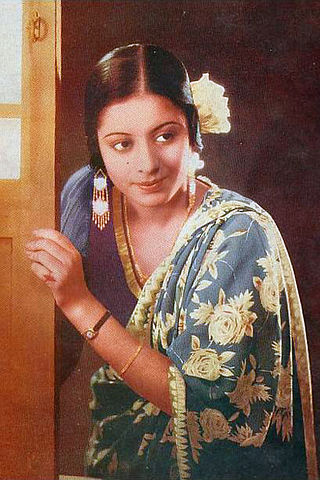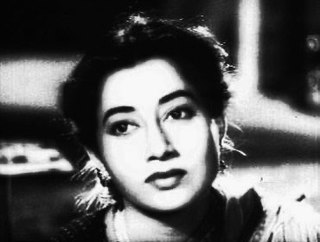Related Research Articles

Mahasweta Devi was an Indian writer in Bengali and an activist. Her notable literary works include Hajar Churashir Maa, Rudali, and Aranyer Adhikar. She was a leftist who worked for the rights and empowerment of the tribal people of West Bengal, Bihar, Madhya Pradesh and Chhattisgarh states of India. She was honoured with various literary awards such as the Sahitya Akademi Award, Jnanpith Award and Ramon Magsaysay Award along with India's civilian awards Padma Shri and Padma Vibhushan.

Sarat Chandra Chattopadhyay, was a Bengali novelist and short story writer of the early 20th century. He generally wrote about the lives of Bengali family and socity in cities and villages. However, his keen powers of observation, great sympathy for fellow human beings, a deep understanding of human psychology, an easy and natural writing style, and freedom from political biases and social prejudices enable his writing to transcend barriers and appeal to all Indians. He remains the most popular, translated, and adapted Indian author of all time.

Kanan Devi was an Indian actress and singer. She was among the early singing stars of Indian cinema, and is credited popularly as the first star of Bengali cinema. Her singing style, usually in rapid tempo, was used instrumentally in some of the biggest hits of New Theatres, Kolkata.

Barsaat Ki Ek Raat is a 1981 Bollywood thriller film starring Amitabh Bachchan, Raakhee, Amjad Khan and Utpal Dutt. It was directed by Shakti Samanta. The film was simultaneously shot in two languages, Hindi and Bengali. The Bengali version, titled Anusandhan, became the highest grossing Bengali film of all time and remained at the spot for several years. The story was adapted from the novel Anushandhan by Shaktipada Rajguru. The Hindi version was an average grosser.

Annapurna, Annapurneshwari, Annada or Annapoorna is a manifestation of Parvati and is known as the Hindu goddess of food and nourishment. Worship and offering of food are highly praised in Hinduism, and therefore, the goddess Annapurna is regarded as a popular deity. She is a manifestation of the goddess Parvati, the wife of Shiva, and is eulogized in the Annada Mangal, a narrative poem in Bengali by Bharatchandra Ray. The Annapurna Sahasranam is dedicated to the goddess and praises her one thousand names, while the Annapurna Shatanama Stotram is dedicated to her 108 names.

Bikash Roy was an Indian actor and filmmaker who is known for his work in Bengali cinema. He is well known for his character roles and for his own style of acting in Bengali films from the late 1940s until the mid-1980s.

Basanta Choudhury was an Indian actor in Bengali and Hindi films. He worked with directors Asit Sen, Rajen Tarafdar, Ajay Kar and Bijay Bose, often in leading roles. He is a former Sheriff of Kolkata.
Lagan is a 1941 Indian Hindi language film. It was the fifth highest grossing Indian film of 1941. The film was directed by Nitin Bose for New Theatres Ltd. Calcutta. The film was a bilingual with K. L. Saigal and Kanan Devi acting as the lead in its Bengali language version, Parichaya. The music for both versions was by R. C. Boral. This was the last film Saigal did for New Theatres, Calcutta, before his move to Bombay to make films for different studios there.
Gurudas Banerjee, also known as Gurudas Bandyopadhyay, is a Bengali stage and film actor who was active from the 1940s through the 1980s. As an actor, he commonly played holy men, especially the 19th century Bengali mystic Sri Ramakrishna, a role he was said to "almost monopolize." He acted in more than 80 films, mostly in Bengali. With his wife, actress Molina Devi, he also directed a Calcutta-based theatre troupe, M. G. Enterprises.
Street Singer is a 1938 Hindi film directed by Phani Majumdar. It was produced by New Theatres Calcutta and was Phani Majumdar's first Hindi film as a director. The film was made in Bengali as Sathi in the same year. It starred K. L. Saigal, Kanan Devi, Jagdish Sethi and Bikram Kapoor. The music was composed by R. C. Boral with lyrics written by Arzu (Arzoo) Lucknavi. Two street urchins dream of singing and making it big in the glamorous world of theatre in Calcutta. They grow up with the girl being employed while the boy is not. The story follows them through first their enchantment and then the disillusionment with the theatre. Finally both choose to return to their roots in the village.
Abatar also known as Avatar is a 1941 Indian Bengali mythological social drama film directed by Premankur Atorthy. The film was produced by Sree Bharat Lakshmi Pictures. The music of the film was composed by Himangshu Dutta, who is referred to as Surasagar Himangshu Dutta. He made use of Rabindra Sangeet in his compositions and helped familiarize S. D. Burman to its use in composing semi-classical songs. The cast included Durgadas Bannerjee, Ahindra Choudhury, Jyotsna Gupta, Tulsi Lahiri, Utpal Sen and Panna Devi. The film is a mythological rendering along with satire of modern society and rapid extension of generation through industrialization, economy and modern politics during second world war. The story of the film tells about King Indranath's misfortunes and the descent to earth of gods incarnated as humans.
Sathi is a 1938 Indian Bengali film directed by Phani Majumdar and produced by New Theatres. It was the Bengali version of Street Singer and the film was the debut of Phani Majumdar as a director. The film's cast includes K. L. Saigal, Kanan Devi, Boken Chatto, Amar Mullick, Sailen Chowdhury, and Shyam Laha. The story involves two young street children growing up together, singing on the streets and hoping to make it big in the show world. The film was one of Saigal's "most famous films" and a "classic" as far the music and songs of the films were concerned. The music was composed by R. C. Boral with lyrics by Ajoy Bhattacharya.

Srikanta, also spelled Srikanto, is a Bengali novel written by Sarat Chandra Chattopadhyay. Published in four parts between 1917 and 1933, It has been described as Sarat Chandra's 'masterpiece'. The novel takes its title after the name of its protagonist, Srikanta, who lives the life of a wanderer.

Sumitra Devi was an Indian actress who is recognised for her work in Hindi as well as Bengali cinema during the 1940s and 1950s. She is most remembered for her role in the 1952 Hindi film Mamta directed by Dada Gunjal. She was the recipient of BFJA Award for Best Actress for two times. She was one of the exquisite beauties of her time and has been regarded as the most beautiful woman of her time by veterans such as Pradeep Kumar and Uttam Kumar.

Karunamoyee Rani Rashmoni was an Indian Bengali historical drama television series which aired on Bengali Entertainment Channel Zee Bangla and is also available on the digital platform ZEE5. It was premiered on 24 July 2017. The serial was earlier produced by Subrata Roy and then it was produced by Zee Bangla. It completed 1,000 episodes on its third birthday and 1,500 episodes on 26 December 2021. After a successful run of 4+1⁄2 years, Karunamoyee Rani Rashmoni went off-air on 13 February 2022.
Rajlakshmi O Srikanta is a 1958 Bengali drama film directed by Haridas Bhattacharya and produced by Kanan Devi based on the iconic and famous novel Srikanta of the legendary Sarat Chandra Chattopadhyay. This film was released in 1958 under the banner of Srimati Pictures. The film starring Uttam Kumar Suchitra Sen, Anil Chatterjee, Tulsi Chakraborty. Music direction of the film was done by Jnan Prakash Ghosh.
Molina Devi, also known as Molina Debi and Malina Debi, was an Indian Bengali actress of Bengali and Hindi film and theatre. As an actress, she played a wide variety of parts, later frequently playing matronly parts, especially Rani Rashmoni, patroness of the 19th century Bengali mystic Sri Ramakrishna. She acted in several dozen films, mostly in Bengali and Hindi. With actor Gurudas Banerjee, she also directed a Calcutta-based theatre troupe, M. G. Enterprises.
Rani Rasmani is a Bengali historical drama film directed by Kali Prasad Ghosh based on the real-life story of Rani Rasmani. This film was released on 11 February 1955 under the banner of Chalachchitra Pratisthan. Actress Molina Devi played the title role of the movie.
References
- ↑ Ashish Rajadhyaksha, Paul Willemen (10 July 2014). Encyclopedia of Indian Cinema. Routledge. ISBN 9781135943189 . Retrieved 5 December 2018.
- ↑ "Srikanta in Pradipta Bhattacharya's 'Rajlokkhi O Srikanta'". The Times of India. 10 August 2018. Retrieved 15 March 2019.
- ↑ "Indranath Srikanta-O-Annadadidi". indiancine.ma. Retrieved 5 December 2018.